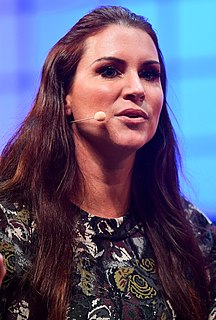A Quote by Stephanie McMahon
Social is about engaging, it's about a conversation, it's about listening and then responding, it's an ongoing conversation with our fan base.
Related Quotes
The conversation should've been about middle class people. The conversation should've been about how to raise the minimum wage and strengthen Social Security. But then we started talking about this whole email stuff again. And now the outcome is that, you know, Donald Trump has somebody who he's looking at to put on his Cabinet who's a lobbyist to privatize Social Security.
We should be able to have a conversation about immigration; we should be able to have a conversation about what skills we want to have in the U.K. and whether we need to go out of the U.K. in order to get them to boost our economy, and I don't think we should have a situation where we can't talk about it.
We are not post-racial. And in many ways we don't even know how to have a conversation about being post-racial. Until we get out of that old-school way of thinking about race and opportunity and the ability to transcend some of the past of this country, then we're going to be stuck in the 20th-century conversation about race.
I think, if you can only talk about your stuff in a jargonistic way, you're not as smart as you think. You're alienating people who deserve to have a conversation, or a place in the conversation. If you take the complete inverse and are staunchly anti-intellectual, then I think there's a certain amount of resentfulness in that. There's something about that standpoint that feels a little bit insecure.
When you watch the way some of the commentators talk about this, it makes it seem as if people are crossing the border every second. How much money have we spent on the border? Why? And who's really exploiting whom?" And then he gets quiet. But I think just airing these out and having a face-to-face conversation about it helps both of us internalize what the conversation is really about. I don't think we have that in the public sphere.
It concerns me when people frame the conversation about equal pay about the entertainment business. I don't want the wage gap issue to be viewed as this myopic problem, because it's not. It's in 98 percent of all businesses, and it's easy for people to dismiss this conversation when they think it's around white women entertainers. But this is about all women in America.


































